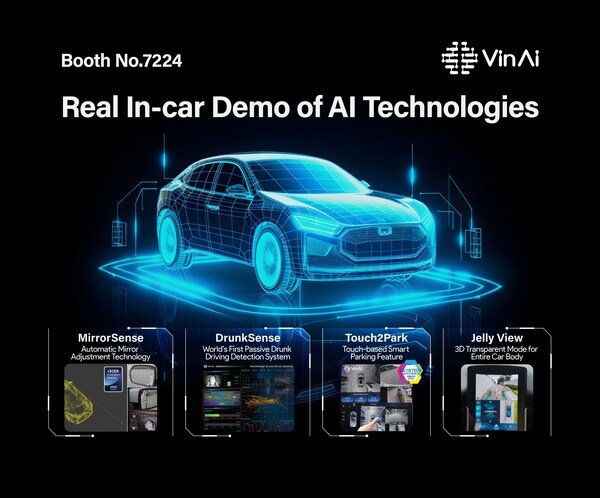VinAI to Demonstrate Latest AI-Enabled Mobility Technologies at CES 2025
Get to Experience the Advanced Technologies such as DrunkSense and Touch2Park in Real World Practical Simulations, Transforming the Concepts of Safety and Convenience in Automotive Advancements.
Image Courtesy: Public Domain : VINAI RETURNS TO CES 2025 WITH CUTTING-EDGE AUTOMOTIVE AI TECHNOLOGIES
VinAI has announced its participation in the Consumer Electronics Show (CES) 2025, taking place from January 7 to January 10, 2025, in Las Vegas, USA. At CES 2025, VinAI will showcase cutting-edge AI technologies such as DrunkSense and Touch2Park in an exclusive in-vehicle demonstration, reaffirming their superior integration capabilities and commitment to delivering groundbreaking mobility experiences for the automotive industry.
From January 7 to January 10, 2025, visitors to booth #7224 in the West Hall of the Las Vegas Convention Center will have the opportunity to experience VinAI's cutting-edge technologies in action on a real vehicle, including:
InteriorSense Suite
- DrunkSense: The world's first passive drunk driving detection system without requiring a breathalyzer, achieving 85% sensitivity—8 percentage points higher than that of the industry standard.
- MirrorSense: As a CES 2024 Innovation Award Honoree, this technology adjusts mirrors with 10mm accuracy based on the driver's position—another world-first innovation.
- Driver Monitoring System (DMS): Compliant with EU's General Safety Regulations, the system provides AI-powered safety through enhanced occupant monitoring.
SurroundSense Suite
- Touch2Park: Touch2Park is the winner of the 2024 AutoTech Breakthrough Award. This Level 2 smart parking solution enables effortless parking by a simple touch.
- Jelly View: A revolutionary 3D transparent mode offering comprehensive exterior and undercarriage visibility.
- Advanced 360° Surround View Monitoring System: The system eliminates blind spots and enhances external awareness for safer navigation.
Mr. Vuong Cap, Director of VinAI's Smart Mobility Division, shared: "VinAI's AI solutions are developed with a focus on optimizing performance on systems with limited resources. This enables automotive manufacturers to integrate advanced technologies without requiring hardware upgrades, reducing costs and enhancing competitiveness. This flexible approach not only broadens the applicability of AI but also meets the growing demand for smart and safe vehicles from automakers worldwide."
Automotive manufacturers (OEMs) in the U.S. are under increasing pressure to enhance the safety, comfort, and intelligence of their vehicles. However, providing cutting-edge AI features while maintaining competitive costs and production timelines poses a significant challenge for many OEMs. VinAI addresses these challenges with efficient and flexible AI solutions designed to deliver safer and more comfortable driving experiences without demanding excessive resources from OEMs.
Currently, VinAI offers smart mobility solutions for the automotive industry. Technologies and features developed by VinAI have been integrated into numerous vehicle models by global automakers, with deployment on over 80,000 vehicles to date and projections to reach over 800,000 vehicles within the next five years.























